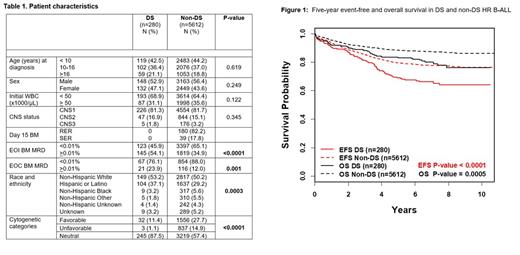Introduction: Children with Down syndrome (DS) have a 20-fold increased risk of developing B-acute lymphoblastic leukemia (B-ALL), and demonstrate an increased risk of both relapse and treatment-related mortality (TRM). The Children's Oncology Group (COG) High-Risk (HR) B-ALL trial AALL0232 was permanently closed to DS HR patients due to excessive TRM, primarily due to overwhelming sepsis during times of severe neutropenia. On the successor HR B-ALL trial AALL1131, a primary objective for DS patients was therefore to reduce TRM by enhancing supportive care and modifying some elements of therapy.
Methods: DS HR patients were treated on a single non-randomized stratum, with several modifications compared to non-DS HR patients. The majority of DS HR patients received a three-drug Induction, with only slow early responders (M2/M3 marrow at Induction day 15) receiving a single dose of anthracycline (daunorubicin 50 mg/m 2). Interim Maintenance 1 (IM-1) consisted of four IV courses of intermediate dose (ID; 2,000 mg/m 2) rather than high-dose methotrexate (HD MTX; 5,000 mg/m 2), with leucovorin rescue beginning earlier, at hour 30 and advancing if tolerated to hour 36, rather than at hour 42. Maintenance modifications included administration of vincristine/steroid pulses every 12 instead of every 4 weeks, and equal duration of therapy for boys and girls.
Results: Patient characteristics (Table 1) were similar among the 280 DS HR patients and 5,612 non-DS HR patients except for more frequent bone marrow minimal residual disease (BM MRD) >0.01% in DS vs non-DS patients both at end of Induction (EOI; 54.1% vs 34.9%, p <0.0001) and at end of consolidation (EOC; 23.9% vs 12.0%, p=0.001). DS HR patients were also less likely to have favorable or unfavorable cytogenetics (p <0.0001). In terms of tolerability of the modified IM-1 phase, the duration was significantly longer in DS vs non-DS patients (mean 80.0 ± 16.6 days vs 74.0 ± 14 days, p <0.0001), and delays over 14 days were significantly more frequent (9.7% vs 4.7%, p=0.001). Nevertheless severe toxicities during IM-1 were low, with only 2 DS HR cases of grade 4 mucositis, 2 grade 4 infections, and 1 grade 5 event (sudden death, not otherwise specified). AALL1131 successfully achieved an induction death rate <10% in DS HR patients, although the rate remained significantly higher than in non-DS patients (3.6% vs 1.7%, p=0.035). Event-free survival (EFS) and overall survival (OS) in DS HR patients were improved compared to outcomes on older trials but remained significantly lower than non-DS patients (Figure 1), with 5-year EFS 69.1 ± 3.1% vs 79.5 ± 0.6% (p <0.0001), and 5-year OS 83.3 ± 2.5% vs 88.4 ± 0.5% (p=0.0005). Among DS HR patients, outcomes were particularly poor among those with EOC MRD >0.01% compared to those with EOC MRD <0.01% (5-year EFS 25.8 + 9.9% vs 62.2 + 6.6%, p <0.0021; 5-year OS 54.0 + 12.2% vs 88.1 + 4.5%, p <0.0003).
Conclusion: AALL1131 achieved the goal of decreasing induction mortality for DS HR patients, and the modified IM-1 phase utilizing ID MTX with early leucovorin rescue was well-tolerated, with minimal grade 4-5 toxicities, despite a longer mean duration and more frequent treatment delays compared to non-DS patients receiving HD MTX. DS HR patients continued to demonstrate disparities in EOI and EOC MRD levels, as well as in 5-year EFS and OS. Innovative strategies utilizing targeted therapies and immunotherapy are needed to further improve outcomes for patients with DS HR ALL.
Disclosures
Wood:Amgen: Consultancy, Membership on an entity's Board of Directors or advisory committees, Other: Institutional Laboratory Services Agreement; Kite: Other: Institutional Laboratory Services Agreement; Novartis: Other: Institutional Laboratory Services Agreement; Beckman-Coulter: Honoraria; Becton-Dickinson: Honoraria; Beam: Other: Institutional Laboratory Services Agreement; Wugen: Other: Institutional Laboratory Services Agreement; Macrogenics: Other: Institutional Laboratory Services Agreement; Biosight: Other: Institutional Laboratory Services Agreement. Raetz:Pfizer: Research Funding; Bristol Myers Squibb: Membership on an entity's Board of Directors or advisory committees. Hunger:Amgen: Current equity holder in publicly-traded company, Honoraria; Jazz: Honoraria; Servier: Honoraria; Novartis: Consultancy.


This feature is available to Subscribers Only
Sign In or Create an Account Close Modal